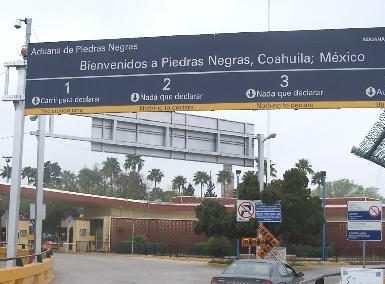There’s more good news for free trade in Arizona and North America.
Two new reports from the independent International Trade Commission (ITC) and the White House trade office lay out the added benefits of a new free trade agreement between the U.S., Mexico and Canada, called the United States-Mexico-Canada Agreement, or USMCA.
More jobs. Higher gross domestic product. Zero tariffs.
Steps by Mexico to advance labor reforms supported by the U.S. through its Congress are also raising expectations that the deal will be ratified.
White House Economic Adviser Kevin Hassett sounded more optimistic after the ITC issued its report.
“There’s broad bipartisan support for economic policies that help blue collar workers, help manufacturing make the economy stronger,” Hassett said at the White House Monday, indicating the deal should now receive congressional approval.
Not everyone is so sure. Democrats in Congress sent out three letters to the U.S. Trade Representative this month expressing concerns about environmental, labor and other provisions in the USMCA.
Bipartisan report shows why USMCA works
For Arizona, the deal is imperative. Mexico and Canada are the state’s largest trading partners. Without USMCA, North America’s system of free trade could collapse, which would mean “a minimum” of $179 million to $2.1 billion in extra taxes for Arizona industry, compared to zero tariffs today, according to the Arizona Manufacturers Council and the National Association of Manufacturers (NAM).
When NAFTA, the North American Free Trade Agreement, was ratified 25 years ago, it created the largest free trade zone in the world. Zero-tariff trade has since fueled the economies of the three countries with a combined GDP reaching $21.1 trillion in 2016, according to the Congressional Research Service.
The new modernized USMCA was approved by the leaders of the three countries last November. Lawmaking bodies in each country must ratify the deal before it can be implemented. Canada and Mexico are waiting on the U.S.
A new report from the ITC bolsters hopes for congressional approval. The bipartisan panel, whose review is required before legislative consideration of new trade deals, projects several advantages will result from USMCA’s adoption. Provisions that reduce uncertainty about digital trade and new rules applicable to the automotive sector would have the most impact.
Top points made in the ITC analysis of USMCA show that it would:
- Bolster U.S. gross domestic product by 0.35 percent, or $68.2 billion, and add 176,000 jobs.
- Increase U.S. exports to Canada by $19.1 billion and $14.2 billion with Mexico.
- Increase U.S. auto parts production but also hike automobile prices for consumers.
- Have a positive impact on all broad industry sectors within the U.S. economy, including manufacturing.
White House report also cites benefits to auto sector
A separate report also released this month from the office of the United States Trade Representative cites new benefits for the automotive sector:
- A total of $34 billion in new automotive manufacturing investments in the U.S.
- An estimated $23 billion in new annual purchases of U.S. made automotive parts
- About 76,000 new jobs in the U.S.
Manufacturers are saying….
Manufacturing would see the largest gains in output, exports, wages, and employment, while services would experience the largest gains in output and employment, according to the ITC report.
Key are provisions that strengthen and modernize “America’s innovation engine,” according to NAM.
“The USMCA is a win for manufacturers. This agreement will level the playing field for manufacturers in the United States and support the 2 million American manufacturing jobs that depend on our exports to Canada and Mexico,” Linda Dempsey, NAM’s vice president of international economic affairs, said after the report’s release.
For manufacturers, important provisions include protection for intellectual property, duty-free products, less red tape at the border, and prohibition of anti-U.S. discrimination and anti-competitive activity.
What farmers say….
Across Arizona and the U.S., soybean growers to pig farmers are touting the USMCA that builds upon the strong foundation set by the original NAFTA.
“The USMCA will protect and enhance the market gains we have made in these countries in several important ways,” Arizona Farm Bureau President Stefanie Smallhouse said. “First, it expands market access for our dairy and egg producers and preserves the tariff-free market access established in NAFTA.
“It also creates a more fair-trading environment with Canada for our wheat growers and establishes a non-discriminatory grading process for our products with Mexico. The enhanced science-based trading standards will ensure our farmers and ranchers are not punished for ingenuity and efficiency.”
After the ITC report was issued last week, American Soybean Association president David Stephens emphasized that soybean exports to Mexico quadrupled under NAFTA and to Canada doubled.
“These non-tariff enhancements include the highest enforceable sanitary and phytosanitary standards of any trade deal to date, an enforceable biotechnology chapter that supports 21st century innovations, and create a rapid response mechanism to address trade challenges, Stephens said. “These provisions not only serve to update the North American agreement but set a paradigm for future free trade agreements.”
Nick Giordano, National Pork Producers Council vice president, was another of numerous industry leaders speaking out. U.S. pork producers need “zero-tariff trade restored to our largest export market,” he told reporters after the ITC report was released.
“We are eager to see the removal of U.S. metal tariffs that prompted Mexico’s 20 percent retaliatory tariffs nearly a year ago,” Giordano said.
Arizona industry relies on open trade
Bilateral trade between Arizona and Mexico and Canada grew to $20.2 billion in 2018, representing a 7.7 percent year-over-year increase with Mexico and a 2.4 percent increase with Canada, U.S. Census Bureau data shows.
Without the trade agreement, Arizona would see less manufacturing, fewer jobs and increased taxes with new tariffs, according to an NAM analysis.
If the new USMCA and the current NAFTA fail, many of Arizona’s manufacturers and the workers and communities they support would lose sales as competitors from Europe and Asia continue to enjoy zero tariffs, NAM states. The result would be less manufacturing production and fewer well-paying American jobs in Arizona and the nation.
Democrats’ sticking points
Holding up the deal are congressional Democrats who want assurances that environmental and labor reforms in the agreement are strengthened and enforced. They also are worried that provisions that benefit drug manufacturers will keep medication prices high.
This month, Democrats sent three letters to the U.S. Trade Representative, stating more protections are needed to curtail exports of lead batteries to Mexico and toxic waste polluting waterways along the border including the New River near Calexico and Mexicali.
“Environmental protections in Mexico continue to lag significantly behind the United States and Canada,” states an April 17 letter from 25 Democrats to U.S. Trade Representative Robert Lighthizer.
Labor reforms also must be enforced, they wrote. Mexico is failing to provide workers with basic rights such as the right to organize or bargain collectively.
“Studies have shown that in the manufacturing sector, in the first two decades of NAFTA, real wages for Mexican workers decreased nearly 20 percent while productivity rose nearly 80 percent,” said a letter sent April 11.
Whether recent action in Mexico will meet their demands is uncertain.
Mexico steps up
As part of the new USMCA, Mexico has agreed to reforms including guarantees for workers to have secret ballots in leadership elections and in approving union contracts.
Mexico’s lower house of Congress approved a package of reforms to fulfill its part of the deal. Now, they are readying for a vote in the upper house.
Mexico’s new president, Andrés Manuel López Obrador, has endorsed the USMCA and the reform package. Obrador is experiencing unprecedented public support, adding to confidence that the measure can succeed.
















Add comment